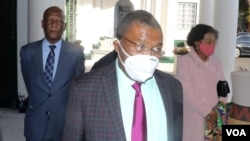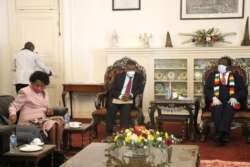Zimbabwe's opposition and rights groups have criticized what they call a “snub” by South African envoys sent to investigate human rights abuses. South Africa sent the delegation after Zimbabwean security forces arrested government critics and shut down a planned anti-government protest. But the envoys met with Zimbabwe’s president Monday, then left without meeting the opposition or rights activists.
A three-member delegation including former South African Minister of Safety and Security Sydney Mufamadi met with Zimbabwe’s president, Emmerson Mnangagwa, on Monday at the State House.
Mufamadi spoke to reporters after the meeting with Mnangagwa.
“We came here as envoys of the president of the Republic of South Africa. We had an exchange with his counterpart," said Mufamadi. "In other words we were listening to the reason of the situation and what is being done. Or intentions to do extra things and so on. And I know you will note to ask us to report to our president through the media. We will be reporting to the President, who will then interact with the public in part through your good selves in due course.”
South Africa, which is the current chair of the African Union, had said the envoys would engage with both the government of Zimbabwe and relevant stakeholders, to “identify possible ways in which South Africa can assist Zimbabwe.”
However, the three left Zimbabwe without meeting any opposition figures or human rights activists.
That resulted in an outcry on social media.
Luke Tamborinyoka, a spokesman of the opposition Movement for Democratic Change, says the party does not blame the trio for not meeting other stakeholders before leaving the country.
“We put the blame on Mr. Mnangagwa himself who, obviously had a meeting with them, made sure the envoys were blocked from meeting with other relevant stakeholders so that they would not fully appreciate the crisis in Zimbabwe," said Tamborinyoka. "But we applaud President Ramaphosa, as the AU chair in his effort to try and understand the situation in Zimbabwe. The mere deployment of an envoy is an appreciation that there is a crisis in Zimbabwe.”
Monica Mutsvangwa, Zimbabwe’s information minister, declined to comment on the MDC’s accusation, saying the government was waiting for President Ramaphosa to issue a statement after being briefed by his envoys.
Last week the Zimbabwe government dismissed claims that it was using COVID-19 restrictions to suppress citizens’ rights.
Rights groups say there has been a spate of intimidation and arrests of government critics. On July 31, security forces halted a planned anti-government protest in Harare, and since then a number of activists have remained in hiding, saying they fear arrest.

